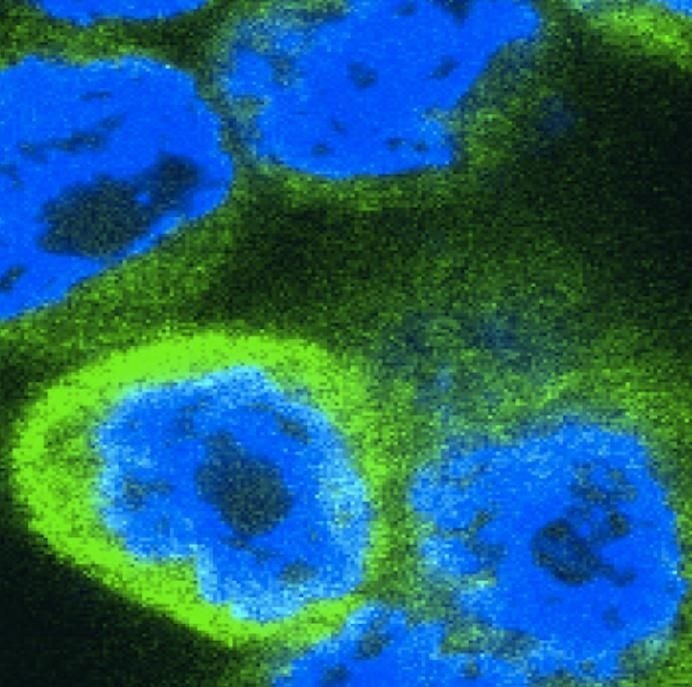Trinity researchers have made a significant advance in understanding how inflammation is controlled. They recently discovered that a crucial immunological alarm protein that was previously thought to quiet the immune response apparently performs the opposite.
 Cells expressing inflammatory cytokines, stained green. Image Credit: Martin Laboratory, Trinity College Dublin.
Cells expressing inflammatory cytokines, stained green. Image Credit: Martin Laboratory, Trinity College Dublin.
Their work has a wide range of possible implications, particularly in terms of comprehending and reacting to autoimmune disorders and inflammation.
While the immune system plays a crucial role in defending us from infection and injury, overly strong immune responses can cause detrimental inflammation, as seen in rheumatoid arthritis and psoriasis. Inflammation occurs when human bodies release “alarm proteins” (interleukins), which boost human defenses against infection and damage by activating various immune system components.
Knowing how and when these alarm proteins are created, as well as how they activate the immune system, has resulted in significant advances in the treatment of a variety of immunological disorders.
Researchers from Trinity’s Smurfit Institute of Genetics, guided by Smurfit Professor of Genetics Seamus Martin, have discovered that Interleukin-37 has an unpredicted function as an immune-activating molecule, whereas previous research postulated that this interleukin served as an “off switch” for the immune system.
Interleukins play key roles in regulating our immune systems in response to bacterial and fungal infections. However, Interleukin-37 has long remained an enigma, as it isn’t found in mammals such as mice. This has presented a major obstacle to figuring out what it does as much of what we know about the human immune system has first been discovered in model organisms whose biological make-ups are similar to ours.”
Seamus Martin, Professor of Genetics, Smurfit Institute of Genetics, Trinity College Dublin
Interleukin-37 was considered to have immune-suppressive activities prior to the latest study, but how exactly it turned off inflammation was hotly discussed. However, the Trinity researchers now find that when triggered properly, Interleukin-37 has significant pro-inflammatory action.
This pro-inflammatory impact was highly unexpected. Our work shows that the protein binds to an interleukin receptor in the skin that is known to play a key role in driving psoriasis. And, to add further intrigue to the story, this brings the total number of immune alarm molecules that signal via this particular interleukin receptor to four.”
Seamus Martin, Professor of Genetics, Smurfit Institute of Genetics, Trinity College Dublin
“Why there are so many interleukins that bind to the same receptor is a mystery, but if we were to speculate it may be because this receptor serves a very important sentinel function in our skin, and that one alarm protein may simply not be enough to respond to the many different infectious agents that our skin encounters,” added Seamus Martin.
Our skin is the major barrier between our bodies and the outside world that microbes must breach if they are to gain entry to our bodies and, in many respects, represents the first line of defense in our immune systems.”
Seamus Martin, Professor of Genetics, Smurfit Institute of Genetics, Trinity College Dublin
As a result, Interleukin-37 and other immunological alarm proteins may have evolved into multiple variations on the same theme, allowing human bodies to identify distinct types of infection by becoming triggered by enzymes unique to each infectious agent.
The study involved various Trinity research groups guided by Professor Martin’s team, which included post-doctoral scientists Dr Graeme Sullivan and Dr Pavel Davidovich, along with research groups led by Professor Ed Lavelle (School of Biochemistry and Immunology) and Professor Pat Walsh (School of Clinical Medicine).
Source:
Journal reference:
Sullivan, G. P., et al. (2022) Myeloid cell–derived proteases produce a proinflammatory form of IL-37 that signals via IL-36 receptor engagement. Science Immunology. doi.org/10.1126/sciimmunol.ade5728.